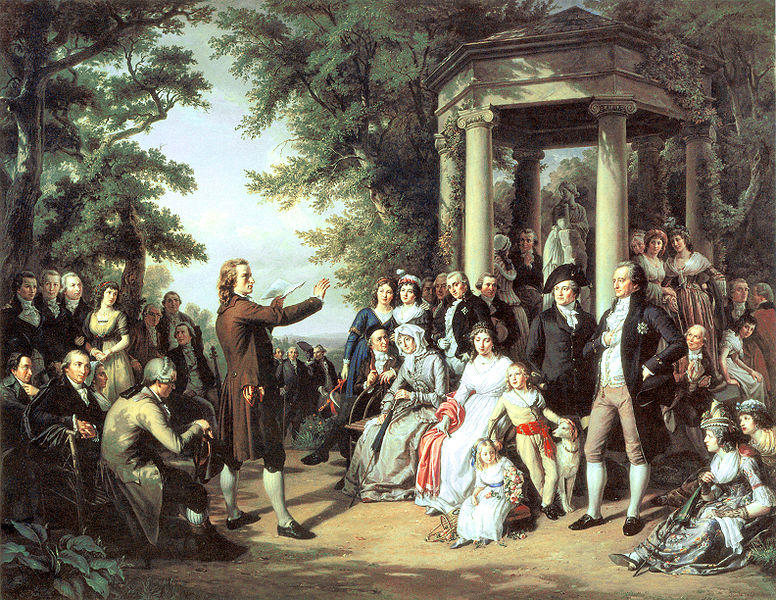Freedom of ____________ means that everyone has a right to express themselves.
Speech
Identify 3 elements that reflect the Enlightenment in this image
1. A philosopher is in the center of the image, teaching people new ideas.
2. A diverse group of people is listening to these new ideas and paying very close attention.
3. The speaker is no longer a king or a member of the church. Instead, he is a regular individual speaking his mind.
In an absolute monarchy, a ______________ or the __________ holds all the power.
The U.S. government has three branches: executive (president), legislative (congress), and judicial (the courts). This is an example of the _______________ of powers, an idea from the Enlightenment.
Separation of powers
No ruler should have absolute _____________, and all individuals have ___________, according to Enlightenment thinkers.
No ruler should have absolute power, and all individuals have rights, according to Enlightenment thinkers.
People are naturally good, society makes them bad, therefore people should have a say in what their government can/cannot do, according to __________.
In a constitutional monarchy, the power is split between different branches of the ____________ and people have _____________.
The ______________ Constitution is an example of a modern document influenced by Enlightenment ideas.
The U.S. Constitution
Separation of powers means __________________.
Power should be distributed across different forms of government.
Government should have different branches of government to provide checks and balances on power, thought ______________.
Montesquieu
Which of these is a characteristic of an absolute monarchy?
A. The monarch gets his power from his lords.
B. The monarch has no authority over the Church.
C. There are no limits to the power of the monarch.
D. The monarch protects the rights of its subjects.
C. There are no limits to the power of the monarch.
The Universal Declaration of Human Rights (1948) says: "Everyone has the right to freedom of opinion and expression; this right includes freedom to hold opinions without interference and to seek, receive and impart information and ideas through any media and regardless of frontiers." This is an example of which idea from the Enlightenment?
Freedom of speech or expression
Individuals have a natural right to ____________, _____________, and _____________, according to Enlightenment thinkers.
Life, liberty, and property (land).
-People are born with natural rights
-The right to life, liberty and property
-All people are born equal
Which Enlightenment thinker believed that these are fundamental rights of all people?
John Locke
The English Bill of Rights placed limits on the power of the king and gave power to Parliament. Which type of government developed as a result of this Bill of Rights?
Constitutional Monarchy
_______________ as defined by the Enlightenment, are the fundamental freedoms and protections to which all individuals are entitled, based on the principles of reason, equality, and the belief that governments should secure these rights for all people.
Human rights
Revolutions occurred around the world inspired by Enlightenment ideas. Which of these ideas about government inspired these revolutions?
A. A monarch's authority to rule comes directly from God.
B. Governments get their power from the consent of the governed.
C. A small group of people should have control of the government.
D. Power should be distributed among different branches of government.
B. Governments get their power from the consent of the governed.
_________________ said: "I do not agree with what you have to say, but I'll defend to the death your right to say it."
Voltaire
In a Republic, the power is given to the government by ______________.
The people
The Enlightenment ideas were revolutionary. How was the world changed by these ideas about individual rights and government?
-Challenged traditional authority by promoting ideas like natural rights, popular sovereignty, and the separation of powers, influencing modern democratic governments.
-Inspired revolutions, such as the American and French Revolutions, that established principles of liberty, equality, and the rule of law.
-Promoted individual freedoms like freedom of speech, religious tolerance, and equality before the law, laying the groundwork for modern human rights movements.